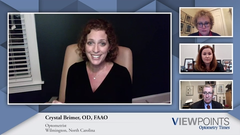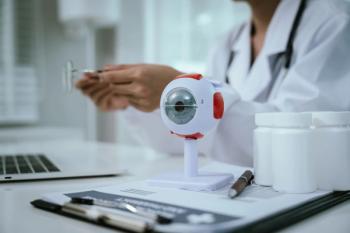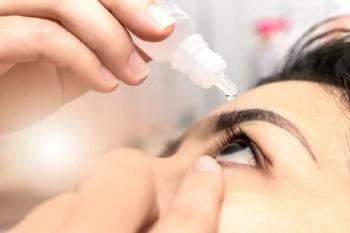
In-office procedures and patient resistance for DED treatments
Episodes in this series

Marguerite McDonald, MD: Tell me a little about the in-office treatments that you offer.
Crystal Brimer, OD, FAAO: I offer thermal expression, of course, and LipiFlow is my go-to because I’ve had it since the beginning. There’s been some other treatments come to market, but when you already have LipiFlow, it is, in my mind, a standard of care when it comes to thermal expression, primarily because it’s heating underneath the lid. Now, with that being said, it’s a line in the sand and ….. evacuate those glands, but it’s up to the patient to change what got you here. Not only that, if it’s the only thing you do, it’s not going to be enough, because their only problem is not MGD [Meibomian gland dysfunction]. My workhorse is the IPL [intense pulsed light], primarily because, I call it my stabilizer, but it works on multiple mechanisms of action. It does so much to reduce the inflammation, that as a secondary benefit, I’m getting cleaner meibum and I’m getting better flow in my meibomian glands, but I’ve also got the incredible benefit of reducing the inflammation. I can see it in the tear film, I can see it in the lid, I can see it in the face. But it’s not immediate, by any means. I’ll do a series of 4 about 3 or 4 weeks apart. But then when they come back for that 6-month visit ….. and they come back again, these people, I can’t drag a complaint out of them and they’re doing almost nothing at home. I have not found anything else that can create that kind of stability in my office and into my patients.
Marguerite McDonald, MD: What do you think of things like lid debridement with a spatula, a little hockey stick, or BlephEx, microblepharoexfoliation?
Crystal Brimer, OD, FAAO: As a diagnostic measure, I debride with the Karpecki Debrider every single visit, just to see what’s there, so that I know do we need to do something to treat the lid margin, do we need hypochlorous acid on there or some other measure. Now, I’ve had BlephEx in the office for years, and I was using it quite a bit as an in-office treatment. I got discouraged. I’m not downing it, it’s a wonderful asset to ….. But I got discouraged because they would come back looking the same. I believe there is a tremendous difference in the patient’s overall outcome and being able to do it at home on a daily basis versus coming in the office and having me do it. I’m a huge fan of NuLids, because it does that same exfoliation, but on a daily basis. What I’ve found is this. When they come back, not only are their lashes clean, but that lid margin is clean. Where they had the strong line of mark staining and the scurf that I was debriding every time, it’s gone. It’s dry and pristine. But what that also means is that their tear film is now cleaner, which means the eye is not as red and the patient is not as bothered. I see this cascade event happening when they’re able to do it at home on a daily basis.
Marguerite McDonald, MD: Crystal, how do you encounter patient resistance to these out-of-pocket procedures? How do you deal with that?
Crystal Brimer, OD, FAAO: I used to like it to death and I felt like I was selling something. The more confidence I gained in my outcomes and my treatments that I offered, I quit doing that. I put all my emphasis on the patient education. I use the Oculus 5M, so I have my collage of pictures up there. It’s nine pictures, I just tell them the story. I tell them their status on the ….. oil ….. inflammation, all these things, and I consider myself a messenger. Once I do that, they’re asking me what we can do. First of all, ….. when it comes to out-of-pocket expenses, but I tell them we’re going to make this decision together. I’m going to tell you the problem, and then I’m going to tell you the good, better, best option, and we’ll make our initial decision based on your best ….. you’re going to be a part of that. When I do that, they know my honest intentions and they know that there’s no pressure to do something that costs out-of-pocket immediately. But I’ve made them aware of it and they know that it’s part of the process, and if what we start at doesn’t work, that’s where we’re headed.
Newsletter
Want more insights like this? Subscribe to Optometry Times and get clinical pearls and practice tips delivered straight to your inbox.






















